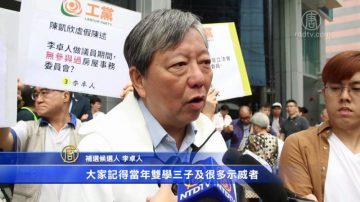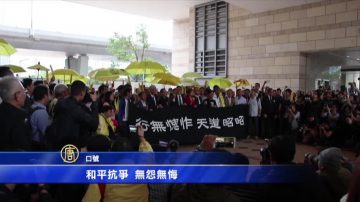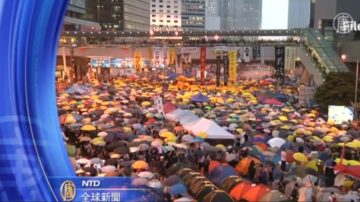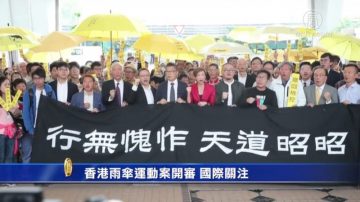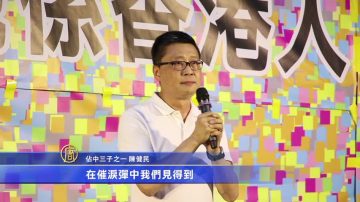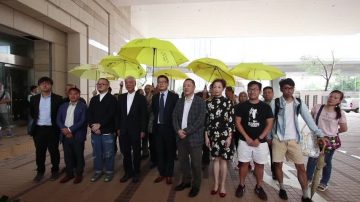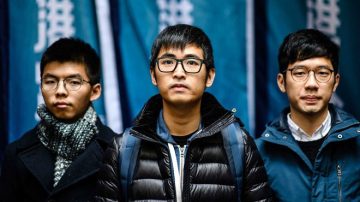【新唐人2014年10月30日訊】持續一個多月的香港民主運動,其和平理性、整潔以及民眾的高素質表現,全球有目共睹。然而,面對香港政府的《民情報告》,何時會寫都仍是未知數時,雨傘下的抗議民眾又該如何做呢?有香港學者表示,這將是一個長期的抗爭。
根據英國廣播公司《BBC》報導,有香港學者認為運動已經進退維谷,暫時看不到政府跟學聯有再次對話的空間;也有充當「中間人」的學者呼籲學聯撤退,認為撤退不代表運動失敗。
香港科技大學社會科學部講座教授,兼中國跨國關係研究中心主任崔大偉認為,學生對於爭民主,應該從長計議。
香港科技大學教授崔大偉:「他們應該知道,可能這次結束了、走了,再過半年,假如沒有甚麼變化,沒有甚麼好的商量,他們又可以出來,假如他們不走,後來就有警察出來打他們,這個對他們也沒有好處,對香港沒有甚麼好處。他們應該做思想準備,這個要求是一個長期的鬥爭,可能10年20年。」
另一方面,「佔中」發起人,陳建民與戴耀廷已經重回工作崗位,恢復教學。他們強調為了運動可以延續下去,必須做出一些調整。但他們不會放棄民主,課餘時間他們會與大家共進退。
他們認為,爭取香港市民的民心,是整個運動重要的一環,仍然希望社會運動能讓人覺醒,這次的佔領主因是由於特區政府不顧民意而來。
香港科技大學教授崔大偉:「在香港,支持民主的人佔55-60%,包括學生,包括中產階級,包括大學畢業的老百姓很多人都支持民主,學生應該考慮,怎麼把那個運動改變,改為一個比較長期存在的組織,這樣他們需要再一次發動學生或參與者。」
學聯祕書長周永康表示,有關運動的轉型,可以考慮推動罷工罷市和罷課,以及將抗爭思想擴展至社區,但強調最切實可行的退場方法,還是要看政府回應。
香港立法會議員 何俊仁:「香港政府是沒有甚麼實權,全權都是在北京那一邊,從這個四中全會結束以來,我們感覺不到北京會有甚麼軟化的一些表示,所以現在還是在一個僵局之中。」
10月28號,香港學聯在公開信中說,如果要想讓談話取得成果,香港政府應該遞交一份報告給中共,反映香港人對自由選舉的要求。如果不這樣做的話,抗議領袖將要求會見中共總理李克強。
香港科技大學教授崔大偉:「中央不會讓步,這個很清楚。所以他們應該考慮怎麼用其他的要求其他的方式,假如中央要更多限制香港的民主,還有很多人可以出來,我們看每年七月一號,有幾十萬人出來了,每年都是這樣,所以這個已經告訴中央,香港人希望香港的民主可以往前走,也不能越來越限制這個民主,這個信息已經很清楚。」
10月28號,雨傘運動屆滿一個月,香港金鐘廣場一朵朵傘花,成千上萬的香港市民,爭民主的抗議者,默哀87秒,紀念警方向市民發放催淚彈。
學聯祕書長周永康:「我想每一個人都對香港未來的政改都感到悲觀,因此我們才站出來抗爭。」
香港市民:「這個月所發生的事情比任何電影和戲劇都更具戲劇性,我想沒有人會想到政府會這樣對待我們。」
著名影後葉德嫻出現在集會上,坦言自己屬於老一輩,在獅子山下長大的人,但今天山下已面目全非。
香港演員葉德嫻:今日在獅子山下見到有許多高樓大廈,看起來好像很好一樣,但為何有這麼多人出來呢!因為這個只是美好的表面,我們要的是真的,我們要的是真普選。
這場「雨傘運動」已經成為1997年主權交接以來,中共對香港主權面臨的最大挑戰。
採訪/秦雪 編輯/黃億美 後製/李智遠
Hong Kong Scholars: Umbrella Movement A Long-term Fight
The Hong Kong pro-democracy movement has lasted for over
a month, the world has witnessed that the protesters are
peaceful and tidy with a high-quality performance.
However, it is still unknown when the Hong Kong government
will send a report to Beijing, explaining the protesters’
dissatisfaction with the election plans.
What should the protesters do next?
Some Hong Kong scholars say that this will
be a long-term fight.
The BBC reported that some Hong Kong scholars observe
that the protest has been in a dilemma.
They currently cannot see room for dialogue again
between the students and the government.
Some scholars urge the students to go home, because going
home doesn’t mean the pro-democracy movement is defeated.
David Zweig, Professor at Hong Kong University
of Science and Technology says that
the students pro-democracy movement
should have a long-term plan.
David Zweig: They should know if they leave now,
after six months, if there are still no changes,
no doubt, they will come back again.
If they don’t leave now, the police will beat them, which is
not good for them and not good for Hong Kong either.
They should be thinking about their quest being a long-term
fight, which may be last for 10 or 20 years.
Co-founders of Occupy Central Chan Kin-man and Benny Tai
had returned to work, resuming their teaching jobs.
They stressed that the protest can carry on,
but need some adjustment.
They stressed that they will never give up on democracy.
After work, they can join the protest.
They say that to win Hong Kong citizens’ trust is the
important step during the entire movement.
They still hope the protest can awaken the people.
The Occupy Central was caused by the Hong Kong government
for ignoring citizens’ opinions.
David Zweig: In 1635, 55 to 60 percent of people support
democracy in Hong Kong.
It included students, political and business classes.
It also included many university graduated citizens.
The students should consider how to adjust the protest,
changing it to a long-term plan, so they need to encourage
the students and participants to hold a protest again.
Alex Chow, Secretary-general of the Hong Kong Federation
of Students said that regarding the adjustment of the
movement, it should consider to push forward workers, shops
and students strike.
As well as extending the pro-democracy thoughts
to the communities.
He stresses that the initial idea of ending the protest is
up to the government’s response.
Albert Ho, member of the Legislative Council of Hong Kong:
The Hong Kong government has no real power,
the real power is in Beijing.
Since the conclusion of the fourth Plenary Sessions,
we hadn’t see any soft signal from Beijing,
so we are still in a deadlock with no solution.
On Oct. 28, the Hong Kong Federation of Students issued
an open letter.
It stated that in order to obtain a result of dialogue, the
Hong Kong government should send a report to Beijing
explaining the Hongkongers wish to have free
elections in 2017.
Otherwise leaders of protest ask for direct talks
with the Chinese Prime Minister Li Keqiang.
David Zweig: Beijing will not make a concession, protesters
should consider the other way.
If Beijing wants to narrow down more democracy in
Hong Kong, many people will step out.
Every year on June 1 and July 1, tens of thousands of
Hongkongers will join the protest.
It happens every year.
So the messages had been sent to Beijing that the Hongkongers
hope to push their democracy forward, but not restrict it.
The messages are very clear.
On Oct. 28, the umbrella movement has lasted more than
one month, hundreds of thousands of pro-democracy protesters
held umbrellas in Admiralty Square and kept silent for
87 seconds, the length of time the police used to fire tear gas.
Alex Chow: I think everybody's pessimistic towards the
political reform for Hong Kong in the future.
Hong Kong citizen: This month was more dramatic than
any drama or any movie.
I think no one would expect the government to
treat us in this way...
Hong Kong actress Deanie Ip appeared at the rally, she said
that she belonged to the old generation, growing up in
Lion Rock, however, today, the mountain was unrecognizable.
Deanie Ip: today there are many sky high buildings under the
Lion Rock, it seems very nice.
However, why do so many people take to the street?
Because the nicety is only on the surface,
we need real elections!
A genuine democratic election!
The umbrella movement has become the biggest challenge facing
the Chinese Communist Party in Hong Kong since
the handover in 1997.
Interview/QinXue Edit/Huang Yimei Post-Production/Li Zhiyuan
根據英國廣播公司《BBC》報導,有香港學者認為運動已經進退維谷,暫時看不到政府跟學聯有再次對話的空間;也有充當「中間人」的學者呼籲學聯撤退,認為撤退不代表運動失敗。
香港科技大學社會科學部講座教授,兼中國跨國關係研究中心主任崔大偉認為,學生對於爭民主,應該從長計議。
香港科技大學教授崔大偉:「他們應該知道,可能這次結束了、走了,再過半年,假如沒有甚麼變化,沒有甚麼好的商量,他們又可以出來,假如他們不走,後來就有警察出來打他們,這個對他們也沒有好處,對香港沒有甚麼好處。他們應該做思想準備,這個要求是一個長期的鬥爭,可能10年20年。」
另一方面,「佔中」發起人,陳建民與戴耀廷已經重回工作崗位,恢復教學。他們強調為了運動可以延續下去,必須做出一些調整。但他們不會放棄民主,課餘時間他們會與大家共進退。
他們認為,爭取香港市民的民心,是整個運動重要的一環,仍然希望社會運動能讓人覺醒,這次的佔領主因是由於特區政府不顧民意而來。
香港科技大學教授崔大偉:「在香港,支持民主的人佔55-60%,包括學生,包括中產階級,包括大學畢業的老百姓很多人都支持民主,學生應該考慮,怎麼把那個運動改變,改為一個比較長期存在的組織,這樣他們需要再一次發動學生或參與者。」
學聯祕書長周永康表示,有關運動的轉型,可以考慮推動罷工罷市和罷課,以及將抗爭思想擴展至社區,但強調最切實可行的退場方法,還是要看政府回應。
香港立法會議員 何俊仁:「香港政府是沒有甚麼實權,全權都是在北京那一邊,從這個四中全會結束以來,我們感覺不到北京會有甚麼軟化的一些表示,所以現在還是在一個僵局之中。」
10月28號,香港學聯在公開信中說,如果要想讓談話取得成果,香港政府應該遞交一份報告給中共,反映香港人對自由選舉的要求。如果不這樣做的話,抗議領袖將要求會見中共總理李克強。
香港科技大學教授崔大偉:「中央不會讓步,這個很清楚。所以他們應該考慮怎麼用其他的要求其他的方式,假如中央要更多限制香港的民主,還有很多人可以出來,我們看每年七月一號,有幾十萬人出來了,每年都是這樣,所以這個已經告訴中央,香港人希望香港的民主可以往前走,也不能越來越限制這個民主,這個信息已經很清楚。」
10月28號,雨傘運動屆滿一個月,香港金鐘廣場一朵朵傘花,成千上萬的香港市民,爭民主的抗議者,默哀87秒,紀念警方向市民發放催淚彈。
學聯祕書長周永康:「我想每一個人都對香港未來的政改都感到悲觀,因此我們才站出來抗爭。」
香港市民:「這個月所發生的事情比任何電影和戲劇都更具戲劇性,我想沒有人會想到政府會這樣對待我們。」
著名影後葉德嫻出現在集會上,坦言自己屬於老一輩,在獅子山下長大的人,但今天山下已面目全非。
香港演員葉德嫻:今日在獅子山下見到有許多高樓大廈,看起來好像很好一樣,但為何有這麼多人出來呢!因為這個只是美好的表面,我們要的是真的,我們要的是真普選。
這場「雨傘運動」已經成為1997年主權交接以來,中共對香港主權面臨的最大挑戰。
採訪/秦雪 編輯/黃億美 後製/李智遠
Hong Kong Scholars: Umbrella Movement A Long-term Fight
The Hong Kong pro-democracy movement has lasted for over
a month, the world has witnessed that the protesters are
peaceful and tidy with a high-quality performance.
However, it is still unknown when the Hong Kong government
will send a report to Beijing, explaining the protesters’
dissatisfaction with the election plans.
What should the protesters do next?
Some Hong Kong scholars say that this will
be a long-term fight.
The BBC reported that some Hong Kong scholars observe
that the protest has been in a dilemma.
They currently cannot see room for dialogue again
between the students and the government.
Some scholars urge the students to go home, because going
home doesn’t mean the pro-democracy movement is defeated.
David Zweig, Professor at Hong Kong University
of Science and Technology says that
the students pro-democracy movement
should have a long-term plan.
David Zweig: They should know if they leave now,
after six months, if there are still no changes,
no doubt, they will come back again.
If they don’t leave now, the police will beat them, which is
not good for them and not good for Hong Kong either.
They should be thinking about their quest being a long-term
fight, which may be last for 10 or 20 years.
Co-founders of Occupy Central Chan Kin-man and Benny Tai
had returned to work, resuming their teaching jobs.
They stressed that the protest can carry on,
but need some adjustment.
They stressed that they will never give up on democracy.
After work, they can join the protest.
They say that to win Hong Kong citizens’ trust is the
important step during the entire movement.
They still hope the protest can awaken the people.
The Occupy Central was caused by the Hong Kong government
for ignoring citizens’ opinions.
David Zweig: In 1635, 55 to 60 percent of people support
democracy in Hong Kong.
It included students, political and business classes.
It also included many university graduated citizens.
The students should consider how to adjust the protest,
changing it to a long-term plan, so they need to encourage
the students and participants to hold a protest again.
Alex Chow, Secretary-general of the Hong Kong Federation
of Students said that regarding the adjustment of the
movement, it should consider to push forward workers, shops
and students strike.
As well as extending the pro-democracy thoughts
to the communities.
He stresses that the initial idea of ending the protest is
up to the government’s response.
Albert Ho, member of the Legislative Council of Hong Kong:
The Hong Kong government has no real power,
the real power is in Beijing.
Since the conclusion of the fourth Plenary Sessions,
we hadn’t see any soft signal from Beijing,
so we are still in a deadlock with no solution.
On Oct. 28, the Hong Kong Federation of Students issued
an open letter.
It stated that in order to obtain a result of dialogue, the
Hong Kong government should send a report to Beijing
explaining the Hongkongers wish to have free
elections in 2017.
Otherwise leaders of protest ask for direct talks
with the Chinese Prime Minister Li Keqiang.
David Zweig: Beijing will not make a concession, protesters
should consider the other way.
If Beijing wants to narrow down more democracy in
Hong Kong, many people will step out.
Every year on June 1 and July 1, tens of thousands of
Hongkongers will join the protest.
It happens every year.
So the messages had been sent to Beijing that the Hongkongers
hope to push their democracy forward, but not restrict it.
The messages are very clear.
On Oct. 28, the umbrella movement has lasted more than
one month, hundreds of thousands of pro-democracy protesters
held umbrellas in Admiralty Square and kept silent for
87 seconds, the length of time the police used to fire tear gas.
Alex Chow: I think everybody's pessimistic towards the
political reform for Hong Kong in the future.
Hong Kong citizen: This month was more dramatic than
any drama or any movie.
I think no one would expect the government to
treat us in this way...
Hong Kong actress Deanie Ip appeared at the rally, she said
that she belonged to the old generation, growing up in
Lion Rock, however, today, the mountain was unrecognizable.
Deanie Ip: today there are many sky high buildings under the
Lion Rock, it seems very nice.
However, why do so many people take to the street?
Because the nicety is only on the surface,
we need real elections!
A genuine democratic election!
The umbrella movement has become the biggest challenge facing
the Chinese Communist Party in Hong Kong since
the handover in 1997.
Interview/QinXue Edit/Huang Yimei Post-Production/Li Zhiyuan

